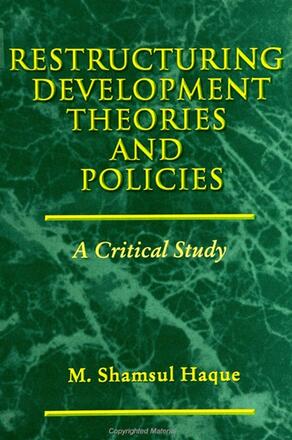
Restructuring Development Theories and Policies
A Critical Study
Alternative formats available from:
Explains and critiques current theories of political development.
Description
In the contemporary global context replete with various forms of development crises, there is a growing demand for an alternative perspective. Haque explains the nature and forms of these current development crises, critiques the inadequacies of existing development theories to address such crises, restructures these theories into an alternative theoretical perspective, and suggests specific policy guidelines for attaining a genuine mode of development. He interprets development not as human conformity with any hegemonic development schemes, but as human autonomy from various forms and levels of subjugation. The book presents original arguments, covers up-to-date literature, adopts a multidisciplinary approach, mediates between theories and policies, and offers a comprehensive development alternative.
M. Shamsul Haque is Senior Lecturer in the Department of Political Science at the National University of Singapore.
Reviews
"A very useful volume for those interested in development studies." — CHOICE
"This is an exceptionally thorough, yet highly accessible, review of the development literature. It is almost encyclopedic in scope, and it connects several debates and perspectives in a very convincing and clear way. In the middle of an intellectual impasse in development studies, this is a powerful and original piece. While consensus on any given theory of development may be hard to reach, there is need for fresh new insights to stimulate a good intellectual debate in this field. This book certainly has the capacity to do that." — Mustafa Koc, Ryerson Polytechnic University
"Haque is justifiably mad at the failure of development efforts in the Third World, and he successfully links these failures to the development problems of growing disparity in the United States and Europe. The data support his claim that development efforts contributed to the problems rather than helped solve them. In being critical of development failures, he covers a wider array of data than some critiques, and the inclusion of cultural data makes a good contribution." — Ted K. Bradshaw, University of California, Davis